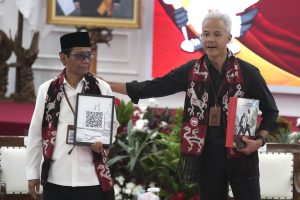The recent decision by the Indonesian Democratic Party of Struggle (PDIP) to nominate Mahfud MD as the vice presidential running mate of Ganjar Pranowo represents a calculated and strategic move, underscoring the ruling party’s astute understanding of the evolving political terrain in Indonesia.
Most obviously, Mahfud’s association with Nahdlatul Ulama (NU), Indonesia’s largest Islamic organization, is politically significant. Although Yahya Staquf, the chair of the NU Executive Board, has taken a clear stand of not directly intertwining the Board with party politics, the NU grassroots is favorably disposed towards Mahfud. This appreciation primarily stems from Mahfud’s perceived high integrity and robust stance on law enforcement. His roots in Madura, East Java, further positions him as an influential figure capable of consolidating the vote in an essential political bastion.
Mahfud’s rich experience spanning various pillars of governance – the legislature, judiciary, and executive – grants him a unique perspective. Having served as a member of the People’s Representative Council, a judge in the Constitutional Court, and a minister, he embodies a comprehensive understanding of the nation’s administrative machinery.
Moreover, Mahfud’s popularity among the Gen Z demographic gives him an edge, especially when juxtaposed against figures Anies Baswedan’s vice presidential running-mate Muhaimin Iskandar, the head of the National Awakening Party (PKB), who also originates from the NU circles. With Mahfud on the ticket, PDIP can hope to turn the tide in regions like West Java and Banten, where the party has historically faced electoral challenges.
However, the ripple effect of Mahfud’s candidacy doesn’t end within PDIP. It has led Prabowo Subianto, the current defense minister and chairman of the Great Indonesia Movement Party (Gerindra), to reconsider appointing Gibran Rakabuming Raka, President Joko “Jokowi” Widodo’s son and the current mayor of Surakarta, as his vice presidential running-mate.
Whatever Prabowo decides, it is clear that political developments within the PDIP have broad implications, influencing decision-making processes across the political spectrum.
Repercussions and Predictions
The PDIP’s nomination of Mahfud carries a number of possible political implications for the competing political parties.
The first is on Prabowo’s own choice of vice-presidential pick. Choosing Gibran Rakabuming Raka would allow him to harness the weight and influence of the Jokowi legacy. However, following this week’s controversial Constitutional Court verdict, which allowed the 36-year-old to run in the February election despite being below the minimum age of 40, partnering with Gibran could be counterproductive. The urban middle class, traditionally Jokowi’s main base of support, appears to have become disillusioned with the recent political maneuverings suggesting that Jokowi is angling to establish a political dynasty.
This calculation has led to Erick Thohir, the current minister of state-owned enterprises, emerging as a likely alternative vice-presidential partner for Prabowo. In his role, Thohir has been involved in economic decision-making. A partnership with Prabowo would merge political acumen with economic expertise, potentially catering to a broader demographic concerned about Indonesia’s economic future, especially in the challenging post-pandemic scenario.
Moreover, Mahfud’s nomination by PDIP underscores the party’s commitment to capture the NU vote and convey a message of steadfast integrity in governance. By presenting a candidate known for strong law enforcement and dedication to transparent governance, PDIP might be trying to realign itself with the principles of justice and integrity, particularly appealing to the younger generation that often seeks such ideals in political leaders.
As the political stage gets set for the next electoral showdown in February, parties will place their bets wisely, attempting to cater to their traditional voter bases and courting the newer, younger demographics. Amid this strategic positioning, it’s clear that the stakes are high, alliances are fluid, and the outcome, while uncertain, will undoubtedly shape Indonesia’s future political trajectory.
The Absence of Jokowi: A Strategic Message from PDIP?
Jokowi’s conspicuous absence from the Ganjar-Mahfud declaration – the president was on a state visit to China – sent multiple messages rippling through the Indonesian political landscape. Such high-profile absences from significant party events are seldom coincidental in the world of politics, and often, they carry implicit meanings that political analysts and insiders are forced to carefully decode.
Jokowi’s nonattendance might be perceived merely as a result of his diplomatic commitments. However, digging deeper and juxtaposing it against PDIP’s internal dynamics backdrop, a more nuanced narrative emerges.
Several PDIP politicians have in recent days suggested to this author that this absence was more than just circumstantial; rather, it might have been a deliberate move orchestrated by party matriarch Megawati Sukarnoputri to send a symbolic message: that PDIP is evolving and recalibrating its direction, and while Jokowi’s contributions have been monumental, the party’s future dynamics may not necessarily revolve around him. Such a message would be all the more important should Jokowi’s son choose to join Prabowo’s competing presidential campaign. This isn’t to undermine Jokowi’s significance but to underscore the party’s ability to reinvent and redefine its strategies independent of any influential figure, even someone as politically successful as Jokowi.
Megawati’s alleged role in this can also be perceived as a strategic assertion of her leadership. By suggesting that PDIP’s current and future strategies can be crafted without the explicit involvement of Jokowi, Megawati might be positioning herself as the principal architect of the party’s future. It’s a reminder that while leaders like Jokowi have played pivotal roles in the party’s past, PDIP’s essence and future lie in its foundational principles and broader leadership rather than being tethered to any individual.
Moreover, this move can also be seen as an attempt to quash any speculation of undue influence or favoritism within the party. By ensuring Jokowi’s absence during such a crucial declaration, PDIP might be emphasizing its commitment to democratic principles, showcasing that decisions are taken based on the party’s collective interests and not merely to propagate a particular legacy.
In the high-stakes game of political signaling, this singular absence might be one of the boldest moves by PDIP, underscoring its autonomy, adaptability, and reaffirmation of its core values as it navigates the complex waters of post-Jokowi Indonesian politics.

































